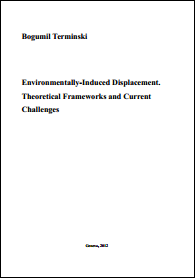Environmentally-Induced Displacement – Theoretical Frameworks and Current Challenges


Abstract
The aim of the paper is to demonstrate environmentally-induced displacement as an increasingly important category of population movement that represents a new set of challenges to the international community and to public international law as well. There are three basic objectives that this work intends to achieve: 1) to argue in favour of distinguishing environmentally-induced displacement from the broader category of migratory movements and thereby making it a fully autonomous concept within the existing taxonomies, 2) to illustrate the diversity and inconsistency of environmentally displaced people (EDPs) theoretical concept, 3) to provide references to earlier theoretical achievements in this particular field of study. For these purposes, the paper tries to capture both the phenomenon of environmental displacement itself, and the problems of people affected by its consequences. Apart from theoretical considerations, it also examines which main factors force people to abandon their homes. Both long-term environmental hazards and short-lived natural disasters are investigated here, and it is shown how they entail significant implications for the dynamics of population mobility. The social consequences of the environmental processes under scrutiny are one of the greatest challenges the international community will face in the coming years. Today, the effects of long-standing environmental changes seem obvious to many citizens of our planet. Desertification, increasing soil salinity, wasteful deforestation, and rising sea levels are just a few of the issues discussed below which influence everyday life for at least two hundred million people worldwide.
(0) Comments
There is no content